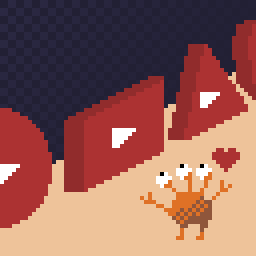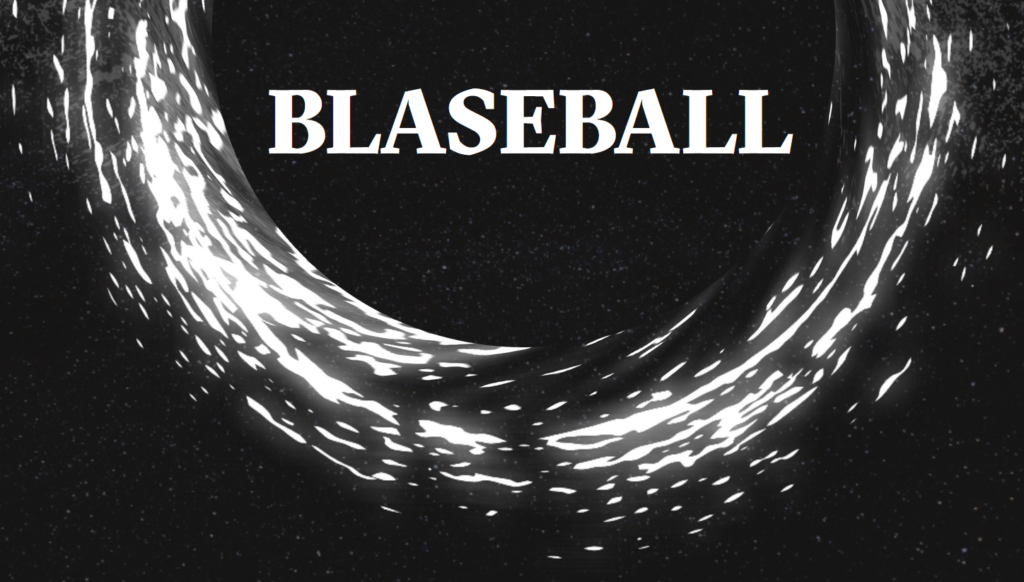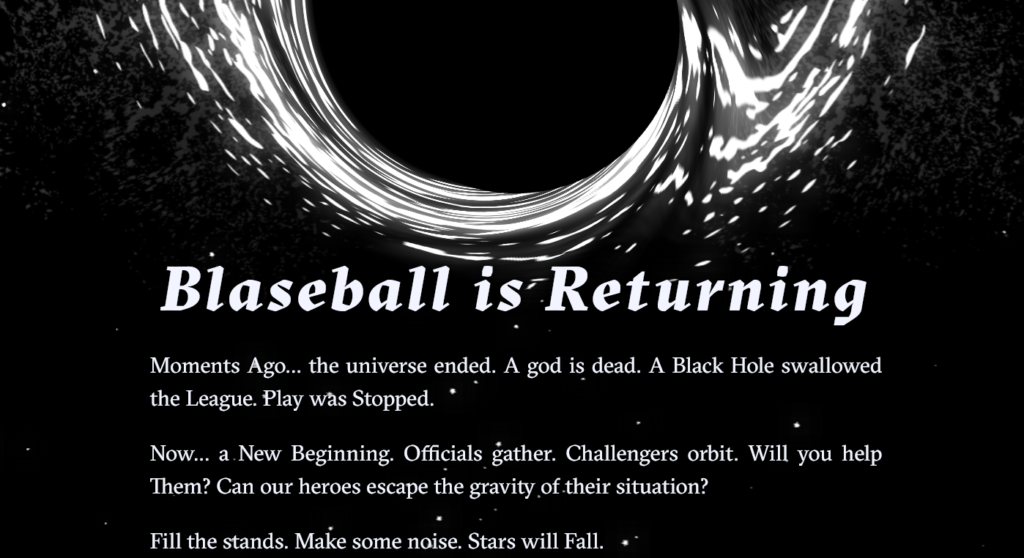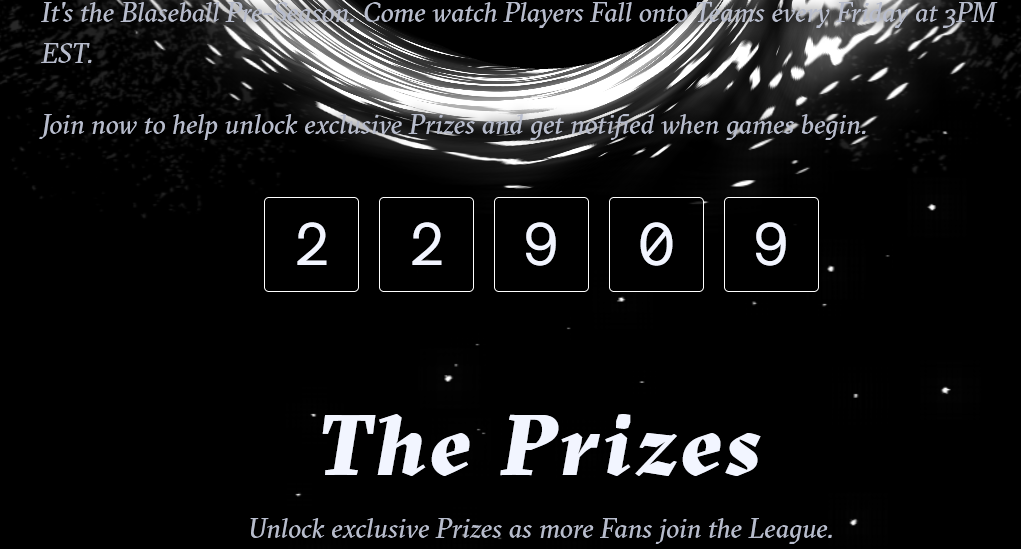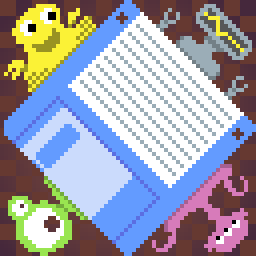
We love it when we find weird and unique indie games to tell you all about! Our alien friends to the left herald these occasions.
It’s been over a year now since Blaseball, beloved highlight of the pandemic lockdown, set its multiple suns for the last time. Its malevolent spinning peanut god ceased its ranting, and its guardian angel squid put away its concessions. If you don’t know what I’m talking about, the blaseball tag here might fill you in. (We love tags! Explore them a bit and you’ll find strange and unusual things.)
In summary: for nearly three years, from June 2020 to June 2023, a small plucky company called The Game Band simulated games of a strange, horror-themed variation of baseball, and allowed users to bet fake money on the outcomes. The synthetic players pitched, batted, fielded, were incinerated, became reincarnated, went undercover, escaped via secret passages and fought gods like that huge spinning peanut and the concept of money itself. It wasn’t bad for a simulation that players could never directly influence: the closest they could come was by spending their hoarded fake wealth on votes to change the rules and edit the players and teams.
In its time it inspired a vast wiki (unaffiliated with Fandom, thank the Squid), an official podcast, a stats reference site, a news network, both official and unofficial explainer videos, a huge pile of fan art, pretend trading cards, and a terrific band. It was probably impossible to keep going indefinitely, but it was nice while it lasted. I’m not the only one who fondly remembers it: the site Just Baseball published a ringing remembrance last year. Here’s that squid again, one more time, for I never get tired of seeing this animation.
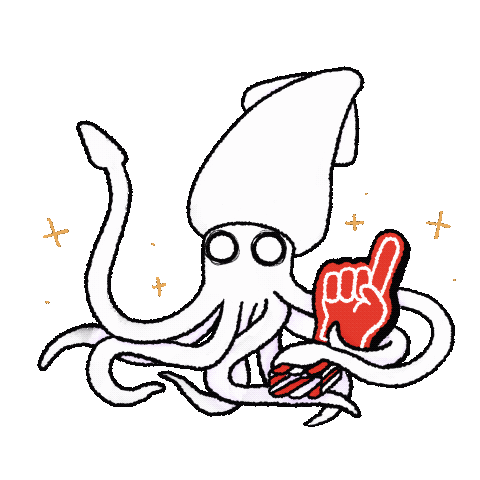
So now there’s a big superfluous-L-shaped hole in our hearts. There have been attempts by others to fill the Infinite Siesta, but none of them have nearly the panache or popularity of the original. This concludes this explanation, but no doubt I’ll be doing it all again in a year or two. Moving on.

So, what is this new thing that might fill the void left by Blaseball? ioBaseball is a very new project that combines Blaseball’s play sim with Balatro’s deck building. It sounds like a cooked-up Buzzword Stew, but even in its very early prototype form there are some interesting ideas there.
ioBaseball is so early-on that the site proclaims that it’s only a demo, and I believe them. Currently the whole game runs in your browser, and log-ins aren’t supported yet. It only saves the play state at the beginning of each game day, so be wary of browsing away from the page accidentally. It doesn’t look like it was made to provide indefinite play as it stands, but it’s worth exploring for a little while.
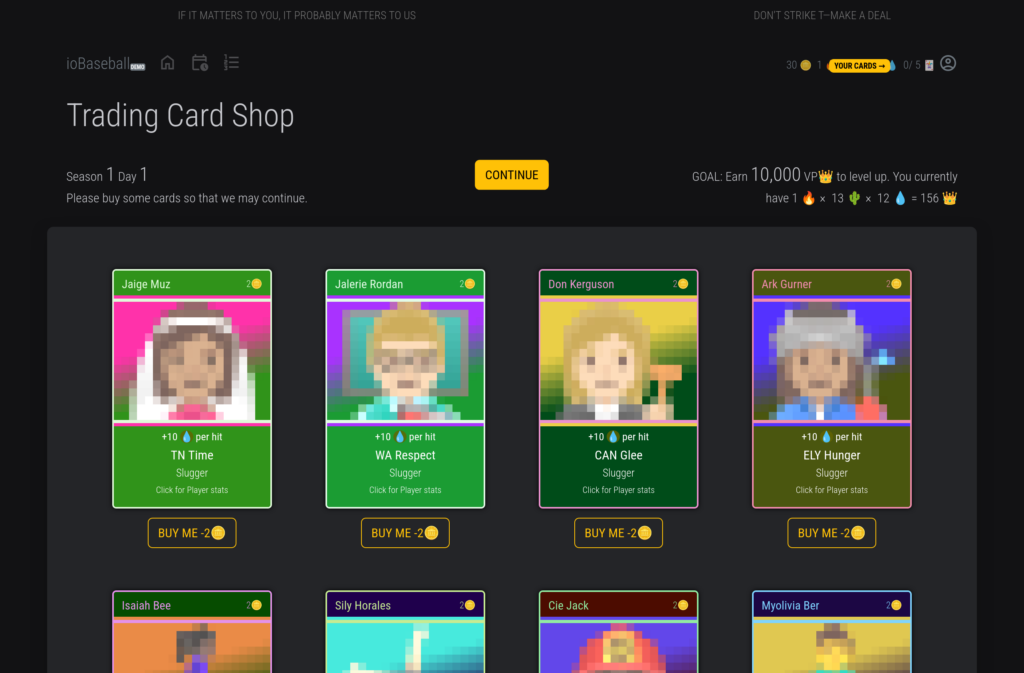
The game begins with a collection of teams and their players. As with Blaseball before it, none of these teams or players are “yours,” and you have no control over any of them. In Blaseball you could adopt a team as your “favorite,” and a player as your “idol,” and get rewards according to how well they did. That is replaced here with a system of trading cards.
The main types are Slugger cards and Pitcher cards, each representing a specific player in the league, and Team cards. Each card gives you a number of one of three colors of “magic points” whenever its depicted character/team does something positive. This means that buying trading cards is making an investment, like buying stock for dividends.
Slugger cards give you “blue” magic points, shown as water drops, when its player gets a hit that puts them on base. Pitcher cards give you “red” magic points, with a fire icon, on its player striking out a batter. And, Team cards earn “green” magic points, little cacti, upon that team scoring a run. You’re free to buy any cards you want, up to your hand size limit, so you aren’t limited to just players on the teams you have cards for, but the different kinds of cards cost different amounts of gamecash (not real money, but instead fake gold pieces), and pay out different amounts of MP. Pitcher cards are by far the most expensive, at 10 gold each, but a good pitcher can be a reliable earner of red MP throughout a whole game.
You need all three kinds of MP. Despite their name, in the current version of the game you can’t cast magical, baseball-related spells with them (presumably with names like Arms of Ruth, Berra’s Wisdom, Curse of Casey, or Tinker to Evers to Chance). Instead they are what get you your experience, or as called here Victory Points. The game multiplies together the three colors of MP you have, and that’s your VP total. Then it goes like Balatro: at the end of each day of games, you have a target score to meet. If you succeed, you lose all your magic points of every color, gain a “Level,” and start the next day with a higher goal. If you don’t quite make the objective you lose one of the five lives you begin with, but you get to keep the MP you had, so the next day you just have to make up the difference.
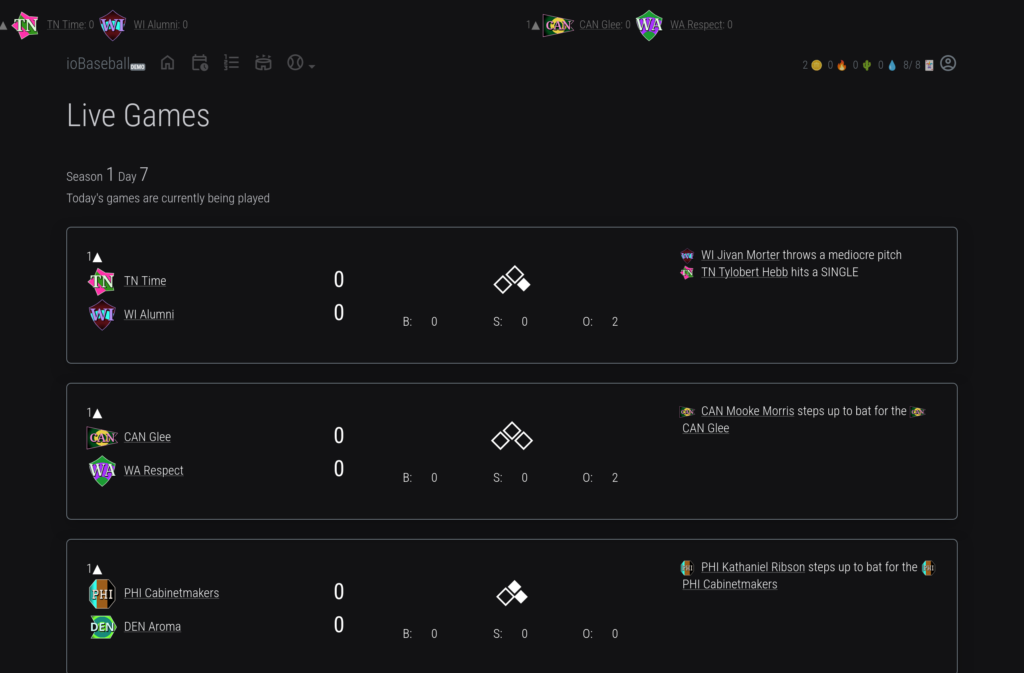
One aspect of this system some of you may already realize… if you have zero of even one of the colors of Magic Points, it means you have zero Victory Points. You must have a source of income of all three colors. Not just that, but baseball, even simulated baseball, is a very random game, prone to unexpected upsets and blowouts. If the winds of fate mean that one of your types of cards produces nothing on a day, then you earn nothing, at all, on that day! The days of the seasons have randomly-assigned games, sometimes a team doesn’t play on a day, and if that team is the only one you have pitchers or sluggers for you’re going to lose a life that day.
To overcome this, it’s essential to diversify, buying multiple cards of all three types. You start out only able to have five cards, but you can use your excess gold to buy expanded slots from a system of upgrades. These work like a mixture of Balatro’s hand levels and vouchers. Each provides a benefit that gets more expensive the more you buy it. At the start of Day One you only have the upgrade that increases your hand size, but each time you lose a life, you get the chance to enable one of three new kinds of upgrades. Some of them are obviously good, but a few, the Fountain, the Boar and the Illusionist, don’t tell up front what you’re buying, and leave you to figure them out. Some upgrades unlock new kinds of cards, that pay off in a variety of ways. One upgrade reduces your Level by 2, which is nowhere near as bad as that might sound. It might be the most important upgrade, and it’s the one that rises in price the fastest.
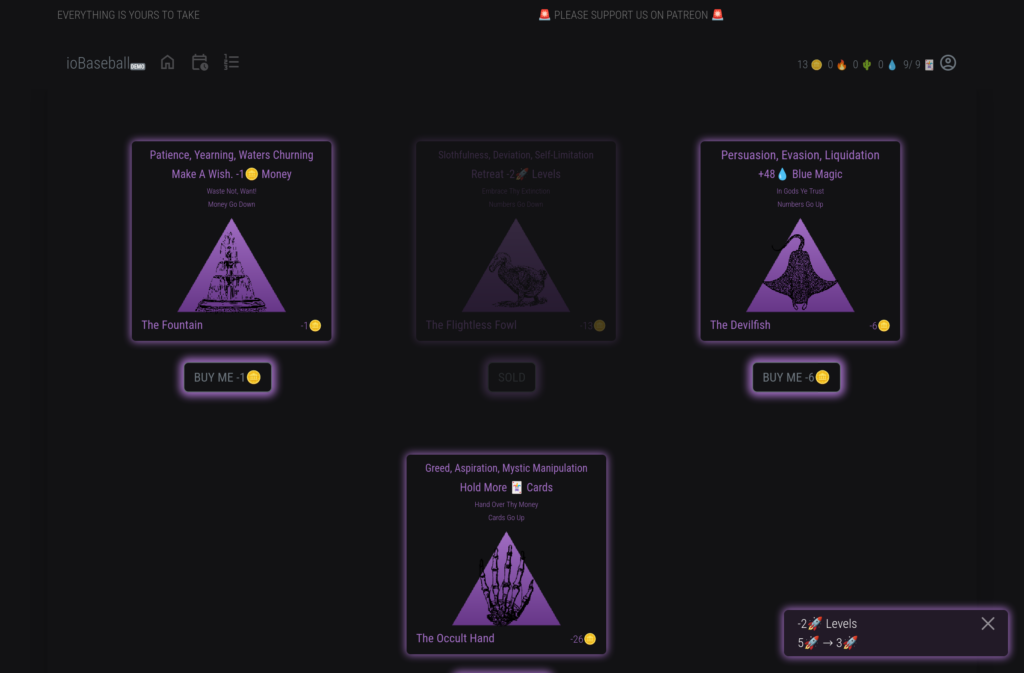
It’s really difficult to do well, especially at the beginning when your only clues to how well a player will perform are unexplained Blaseball-style stats with names like “thwackability.” After a few days the Stats pages on each card will start to give you a good idea of how valuable each player is. In this demo version the player and team stats are not randomized, and you get the same choices of what player cards to buy every day, so your intuitions of which players and teams are worth the gold and hand slots can build over multiple tries. (Note: since I wrote this the game has been updated, and now now only can you select a season scenario, but the world’s stats are re-rolled every real-world month.)
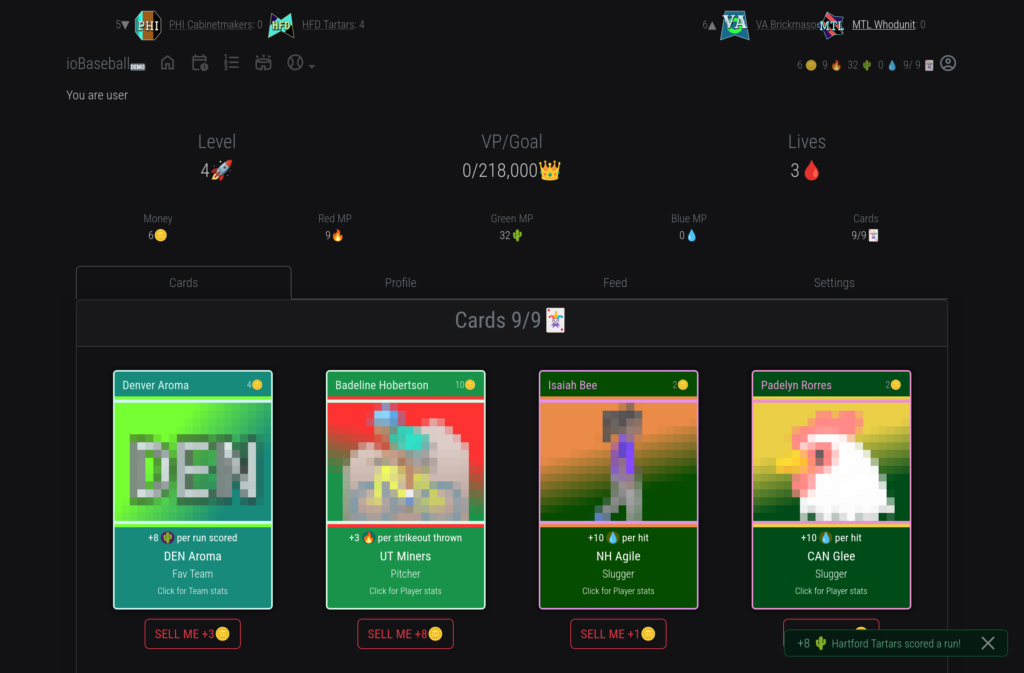
The interface, while bearing some polish, has its glitches. Important game functions are buried, in the style fashionable at the moment, behind Mystery Icons at the top of the page, and I tended to get lost for my first couple of plays. During the game day, you’ll probably want to watch the action (which is all text, this is a Blaseball-inspired game, after all) by clicking on the icon of the little stadium with the three pennants. To see your Victory Points and current hand, and to declare game options, you’ll want to click the little line of numbers at the top-right of the page. It is here where, under the Settings tab, you can speed the simulation speed up from the excruciating NORMAL, up past Bison, Tiger, yes even Hedgehog, to FAST, and experience an entire day of simuball in a couple of breezy minutes. Oh, how rorm* it would be if real baseball had the FAST option, or even just Hedgehog!
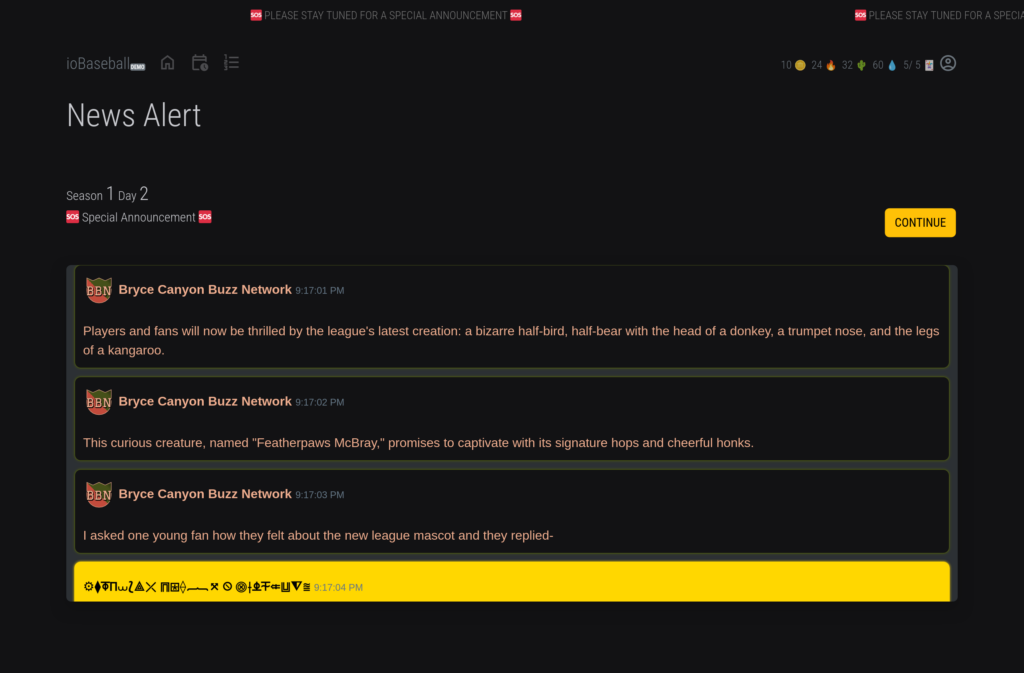
It is obvious that ioBaseball is heavily inspired by its departed predecessor. The trading cards have pixelated images sort of in the style of Balatro, but without nearly the style or wit. But it’s a demo! I’m sure, if it takes off, that there’s a universe of baseball-and-otherwise memes they can slap on those little illustrated boxes. A lot of Blaseball’s dearly missed qlurky stlyle follows over. The completed Innings are called Outings, and there’s a brief story that’s presented within the game that explains the stadium has trouble getting insurance because of angry gods, incinerated players and floods of immateria.
Will ioBaseball catch on, and rise to the levels of its deceased forebear? No one can say. The original needed a cultural event like a pandemic to spark its brief ascent to the skies, and without it soon fell again to the cold wretched earth. But ioBaseball’s three hearts are in the right place, and that matters for a lot.
* rorm, adjective: nice, good, gratifying. From Carl Muckenhoupt’s interactive fiction, “The Gostak.”
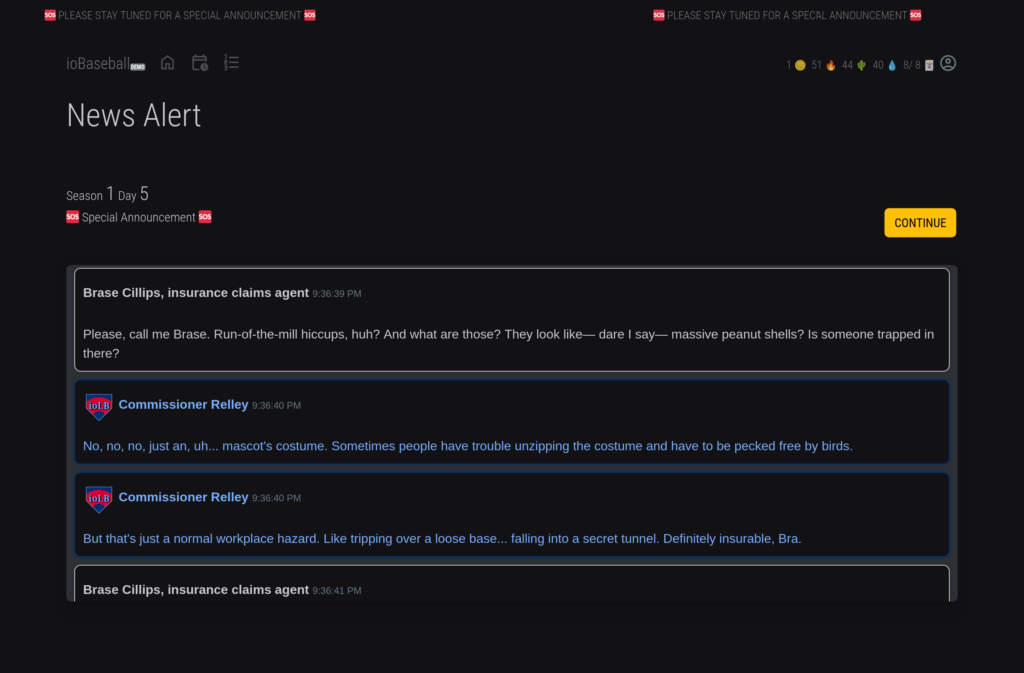
ioBaseball (web, $0) – ioBaseball’s Discord invite


